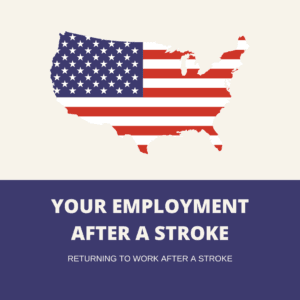Returning to Work After a Stroke: Know Your Rights

An event like this can dramatically alter life—both personally and professionally. Whether recovering personally or assisting a loved one, it’s important to understand options that allow career progress to continue. In the U.S., systems exist to ensure individuals facing major life changes are not left behind at work. This guide outlines key points: what to expect, how to advocate for necessary accommodations, and strategies to continue moving forward in a professional path.
How a Stroke Can Affect Professional Life
This type of episode happens when circulation to brain is interrupted, often due to a blockage or internal bleeding. Effects can vary widely depending on severity and affected region. Individuals may experience limited movement, difficulty speaking, memory gaps, extreme fatigue, or changes in mood. These challenges can make professional tasks more difficult, but they don’t mean leaving a career is necessary.
Many individuals who experience a brain event return to work successfully, often with certain adjustments. This process can feel overwhelming, with concerns about employer reactions, maintaining a position, or facing discrimination. U.S. law offers protections to ensure fair treatment in these circumstances.
Essential Legal Protections for Remaining in a Career After a Major Medical Event
Several federal laws protect employment rights for individuals with disabilities, including those who have experienced a stroke. Key provisions include:
1. Americans with Disabilities Act (ADA)
ADA is a key federal guideline that ensures fair treatment for individuals who’ve gone through a serious neurological event. According to this act:
Any business with a team of 15 or more people must make fair changes or adjustments to help team members who face ongoing health-related challenges continue performing their duties effectively.
You are protected from discrimination based on your disability.
An organization cannot end a position, reduce a job title, or refuse employment solely because of challenges faced after a serious medical event that affects abilities.
Americans with Disabilities Act identifies specific long-lasting physical or mental conditions that substantially increase difficulty in performing daily activities. Since such conditions frequently impact mobility, speech, or information processing, individuals experiencing these challenges may qualify for protections provided under this federal law.
2. Family and Medical Leave Act (FMLA)
FMLA allows eligible employees to take up to 12 weeks of unpaid, job-protected leave per year for serious health conditions, including recovery from this condition. To qualify:
Eligibility for certain federal protections and leave provisions requires an organization to employ at least 50 staff members. Only workplaces meeting this threshold can have these specific provisions apply to individual circumstances.
Eligibility requires a minimum of 12 months of tenure with an organization and at least 1,250 hours worked over the previous 12 months. These conditions ensure sufficient time and experience for qualifying under specific federal provisions.
Although time off under FMLA isn’t paid, it still allows you to step away and focus on getting better without risking your position or losing your coverage.
3. Rehabilitation Act of 1973
This regulation specifically covers individuals working in federal roles or under government contracts. It ensures fair treatment by forbidding unfair treatment due to medical or physical challenges and obligates organizations to make necessary adjustments that help individuals continue performing their tasks effectively in a professional setting.
4. State-Specific Laws
In addition to national provisions, many states implement rules and guidelines aimed at ensuring fair treatment in workplaces. These state-level measures can offer broader coverage, sometimes including smaller organizations not obligated to follow federal standards. They may also specify additional actions companies must take to ensure individuals with physical or mental challenges are treated equitably and have access to adjustments or tools that allow continued contribution in their roles.
Requesting Reasonable Accommodations
A valuable option after a major life event is requesting changes to daily tasks or work environment to maintain effectiveness. Examples of such changes include:
Adjusted schedules (e.g., part-time hours or flexible start times).
Physical modifications to the workplace (e.g., ergonomic chairs or accessible workspaces).
Assistive technology (e.g., speech-to-text software or voice recognition tools).
Reassignment to a different position if you can no longer perform your current role.
To request an accommodation:
Inform Employer: Communicate your condition and how it impacts task performance. While sharing every detail of medical history isn’t required, providing enough information to explain why accommodations are necessary can ensure appropriate adjustments are considered.
Submit a Written Request: While not always required, it’s a good idea to submit your request in writing. This creates a record of your request and ensures clarity.
Provide Medical Documentation: Your company may ask for paperwork from your doctor to confirm why certain adjustments are necessary.
Collaborate on Solutions: Work with your employer to identify accommodations that address your needs while maintaining business efficiency.
Remember, an organization is not required to implement every requested modification, but it must engage in an open, thoughtful discussion to identify adjustments that allow effective performance in a role while still meeting operational needs.

Dealing with Discrimination
Unfortunately, some individuals face unfair treatment at work after experiencing a significant medical event. This may include being passed over for promotions, receiving unequal treatment compared with colleagues, or even losing a position entirely. If you believe treatment has been unjust, here are steps to consider:
Document Everything: Keep detailed records of any incidents, including dates, times, and what was said or done.
Report Behavior: Follow organizational procedures for addressing discrimination. This may include contacting human resources or submitting a formal complaint.
File a Charge with EEOC: If internal reporting does not resolve an issue, a charge of discrimination can be submitted to Equal Employment Opportunity Commission (EEOC). This agency will review the claim and may take action on your behalf.
Talk to a lawyer: If things get tricky, reach out to someone who deals with job-related legal matters. They can walk you through your options and speak up for you if things go further.
Returning to Work After a Stroke
Getting back into your position after a major life event can feel like a mix of emotions—motivating yet overwhelming. Here are a few pointers to help ease your way back in:
Stay in Touch With Your Team:
Maintaining open communication with supervisors and colleagues is essential. Provide regular updates on progress and be upfront about any challenges that could impact task performance. Keeping others informed fosters understanding, enables better planning, and promotes a smoother return to daily responsibilities. Transparency prevents misunderstandings and demonstrates dedication while re-engaging with work.Start Slowly: If possible, consider a phased return to your role. For example, you might begin with part-time hours and gradually take on more responsibilities as you regain strength and confidence.
Focus on Your Strengths: Identify tasks you can perform well and focus on those. This can help you rebuild your confidence and demonstrate your value to the company.
Lean on those around you—whether it’s your team, close friends, or family—for encouragement and help when needed. It can also be uplifting to connect with folks who’ve gone through something similar. Sharing experiences and hearing how others navigated their path can give you fresh perspective, reassurance, and a renewed sense of belonging.
Financial Assistance and Resources
If you’re unable to return to your job immediately—or at all—there are financial assistance programs that can help:
Social Security Disability Insurance (SSDI): If your stroke has left you permanently disabled, you may qualify for SSDI benefits.
Supplemental Security Income (SSI): This program provides financial assistance to low-income individuals with disabilities.
State Disability Programs: Some states provide short-term financial aid for people who are temporarily unable to continue their usual duties due to medical setbacks.
Can my employer reduce my pay or demote me because of my stroke-related limitations?
Compensation cannot be lowered, nor can a position be downgraded, solely because new physical or mental challenges arise—especially when core responsibilities are still being met, either independently or through tools and modifications that make tasks manageable.
Federal provisions exist to prevent unfair treatment stemming from medical setbacks. If leadership changes a role or pay without a legitimate, lawful reason while performance continues to meet essential expectations, such action may violate these protections. Any adjustments to position or salary must be based on actual job performance, not assumptions about capabilities.
If challenges make it difficult to carry out essential duties, even with reasonable modifications, an alternative role may be offered that aligns better with current abilities. Ideally, this new position maintains comparable compensation and level of responsibility. If a job title or income is reduced without just cause related to medical limitations, individuals can contact the Equal Employment Opportunity Commission (EEOC) to understand available options and next steps.
What if my employer denies my request for reasonable accommodations?
If requested modifications for performing duties are denied, start by understanding the specific reason. Organizations must only implement changes that do not create significant difficulty or expense. If refusal is based on perceived burden, ask for clarification. Then, explore alternative options that may be easier to manage while still allowing effective task performance.
If denial seems unjustified, consider these steps:
Submit a Formal Complaint Internally: Check whether your organization has a procedure for addressing concerns when requested adjustments are refused. Human resources or a designated team often handles this process. Filing a complaint this way provides an official channel to express concerns and may lead to reconsideration or alternative solutions.
Contact EEOC: If treatment appears unfair due to challenges related to recovery, a formal complaint can be filed with Equal Employment Opportunity Commission. This agency reviews cases to determine whether proper procedures were followed and if protections were ignored.
Consult a Legal Expert: Seek advice from a professional specializing in workplace fairness and employee protections. They can assess whether decisions align with regulations and guide next steps. Assistance may include drafting formal communications, organizing documentation, or preparing for hearings, providing clarity and confidence throughout the process.
Federal and state laws exist to protect individuals, and many conflicts can be resolved through clear communication and negotiation.
Final Thoughts
Experiencing this condition does not mark the end of a career. With appropriate accommodations, many individuals return to work successfully and thrive. Understanding rights, communicating openly with an employer, and accessing guidance when needed are important steps. Remember, you are not alone—laws, resources, and knowledgeable professionals exist to assist throughout this journey.
If uncertainty arises about next steps, consulting a professional familiar with workplace rules and employee protections is recommended. They can guide through procedures, clarify available options, and ensure fair treatment at every stage.
This experience may alter life, but it does not have to define it. With determination and appropriate resources, individuals can continue building a fulfilling and successful career.



